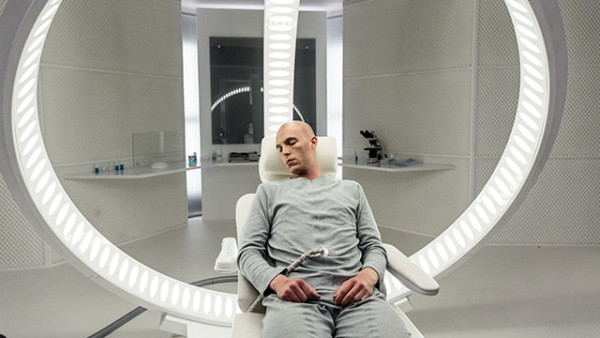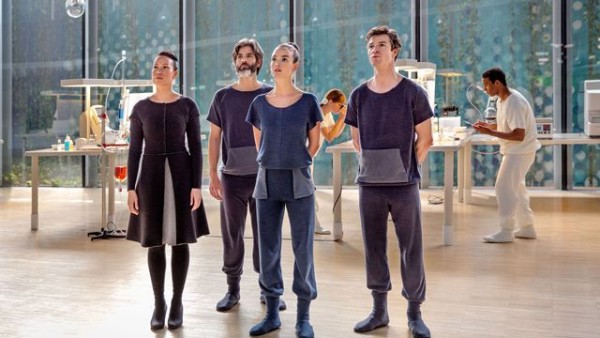
Courtesy of Arcadia Motion Pictures
Much like Embers, Realive is a film that’s steeped in nostalgia and memories, exploring what it means to live a life without love.
Let’s bitch it out…
The word on the street at Fantasia was that Realive was one of the best science-fiction films of the festival, which is hardly surprising considering director Mateo Gil’s history at crafting emotionally resonant films (he’s the writer of The Sea Inside and Open Your Eyes, the source film for Tom Cruise’s Vanilla Sky).
Realive is the story of Mark Jarvis (Tom Hughes), a successful early thirty-something artist/entrepreneur with a stable of beer commercial friends and an on again, off again something with longtime friend Naomi (Oona Chaplin). We learn this via voice over and flashbacks because the film is actually set in 2084 when Mark becomes Lazarus, the first person successfully “reanimated” by the Prodigy company. Back in 2015 he was diagnosed with terminal cancer, given a one year prognosis, and against Naomi’s wishes, elected to cyrogenically fresh himself.
The film takes place in five chapters, bouncing around back and forth in time as Mark adjusts to his new (mostly underwhelming) life. While the science fiction premise suggests that Realive is about Mark’s reanimation, it is really all about his relationship with Naomi. His doubts about abandoning a final year with her in order to commit suicide early so that he’s preserving a better body haunt him, especially when it quickly becomes clear that his quality of life following the resurrection is on par with the chronically ill or the elderly. One brief but effective scene shows Mark watching the world outside of the Prodigy clinic where people walk and exercise, and it is deeply obvious how removed he is from the life that he once had, one that he can never have again.

Courtesy of Arcadia Motion Pictures
As a depiction of the future, director Mateo Gil opts for a fairly standard future-aesthetic including touch screen walls and surfaces, beige / neutral clothing colour schemes and a few technological advances such as Mind Writer, a device that allows users to capture and play back thoughts and memories on a home video system. None of these ideas are novel (both Minority Report and the “The Entire History of You” episode of Black Mirror spring to mind), though the decision to weave these futuristic components into the narrative in a understated fashion ensures that they do not pull focus from the film’s narrative. Still, the introduction of interesting socio-cultural elements of society, particularly the more liberal attitudes towards sex (and the pills that now accompany the act) are passed over disappointingly quickly so that Mark can get back to mooning over Naomi.
I keep coming back to the Mark/Naomi aspects of the plot because this is where the film lives and dies. Much of the present day stuff featuring Mark butting heads with Dr. Victor West (Barry Ward), the man leading the project, is less interesting. There are some fairly standard conflicts tossed in about how many attempts it took before Prodigy successfully revived someone, and how Mark is being groomed to become a living endorsement for the company’s work, but these are either bland or simply uninteresting in comparison to the emotional weight of Mark’s memories from the past.
Thankfully Hughes and Chaplin have chemistry to spare. Many of the flashbacks play out as montages rather than fleshed out scenes, which makes their romance feel like an energetic whirlwind that has stretched out over the years. In Chapter 4, “The Lovers Without A Time” Mark casually recounts the history of their “wrong time” romance and the three to four minute sequence, utilizing the same repeating dialogue, is a quick, digestible summary that helps sell the idea that the pair are meant for each other, regardless of time and space. These kinds of high intensity, passion-fuelled visits to the past help to contrast the cold sterility of the present, which Mark can’t adapt to. The film’s simplest and most effective visual choice for confirming this sense of displacement is Mark’s shaved head, which he keeps even after his hair grows in in an act that visually and symbolically confirms his alien status.
The film’s climax at Prodigy’s press conference, where he is introduced as the world’s first resurrection man, coincides with the height of his depression over Naomi. While these scenes play out in mostly predictable fashion, credit is due to actress Charlotte Le Bon, who plays Mark’s nurse / lover and who infuses these final scenes with a heavy emotional burden. In the end, Realive is a powerful mediation on the impossibility of living without love, an idea that challenges the philosophy of Prodigy and Dr. West that “immortality is only a question of time”. Cheating death may be possible in 2084, but it is uncertain whether the result can truly be said to be living.
Bottom Line: Realive is a solid entry in Mateo Gil’s wheelhouse of deeply resonant emotional dramas infused with genre components. This “wrong time” love story works because of the chemistry between the leads, even if the present day future conflicts pale slightly in comparison. Well worth a look, particularly for fans of Open Your Eyes.
Realive screens again at Fantasia Festival on July 27 at 12:45pm.